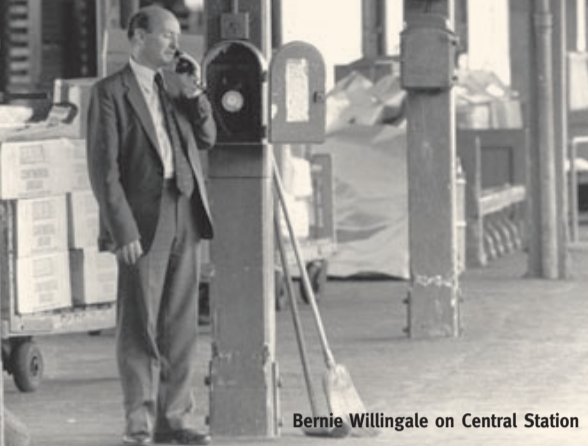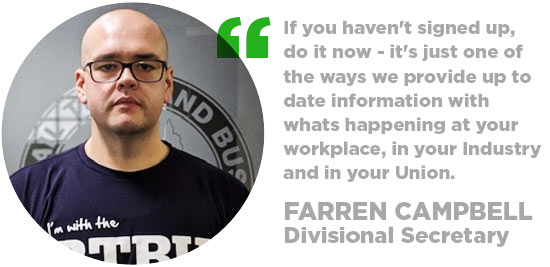Vale Bernie Willingale
Getting to the Footplate

Bernie Willingale was born in 1933, in the depths of the Depression, the son of a railway man, who was a Fitter’s Mate at Enfield all his working life.
Bernie started his career in the railways in 1948 in the railway printing office waiting for an apprenticeship. He wasn’t able to get one so he went to Eveleigh as an apprentice fitter and machinist, two months shy of his 15th birthday – working in the carriage works, steam loco – boiler shop, where in summer time the ‘heat was horrific’.
He terminated his apprenticeship and went to work in the locomotive area. He followed the usual path as a Call Boy, engine cleaner, he worked with the bailiff (the person who looked after tools and other maintenance equipment), trainee enginemen, then as a fireman. This was when Bernie began fighting with management and complaining about the condition of the engines.
“They were hard days in steam”, he said “A very lonely life other than the mateship you had with the Driver. He was an entirely different breed of man. He had to be to endure it – living in the country, hard yakka over the mountains to Bathurst, and hard yakka back in the middle of the night. And not always with headlights in those days. Things were very primitive. It really was a hard life in steam days.” (Rail and Road, May-June 1995).
Bernie claimed that these complaints sealed his fate and his promotion prospects, never being promoted to a driver. He stayed as a fireman and acting driver until he embarked on a long drawn out campaign to win an election to the top job in the union, as Secretary of the AFULE.
These same working conditions are what drove Bernie to fight to improve the plight of his members, and also gained him international recognition for his dedication and research into improving working conditions for locomotive members.
Times were tough then. Bernie accounts: “My dad only worked one fortnight in two. People all around you were getting out at this age and that age, planning this and planning that. I never planned anything because in the Union, you lived for the day…. I worked up to 66 hours a week in the Union office, non-stop, other than four hours with my head down. I was in the union office year after year at 4:25 every morning, and out very late at night. Seven days you worked, so you never stopped to think about getting out. You never stopped to think about your future.” (Rail and Road, May-June 1995).
This research and work with unions from around the world continued long after Bernie retired from the AFULE. He has amassed a wealth of information and has addressed forums around the world on improvements in general working conditions, and fatigue management in particular.
Hard Road to the Top

Bernie was eventually elected to head up the AFULE as its Branch Secretary in 1965. However, Bernie’s first foray into union elections and union politics was a baptism of fire.
In 1964 John ‘Jack’ Bale the Divisional Manager of the AFULE left for Melbourne to take up the Federal position within the union. “The Divisional Manager was equivalent to the modern Branch Secretary, but the rules were such that the position was named Manager to avoid election. The Divisional Manager and Assistant Manager were appointed at the ‘pleasure of the governing body’”. (Bernie Willingale, On Wooden Rails 2005). At the time, AFULE officials were appointed by the Union’s federal body, virtually for life, without elections.
However, Jack Bale’s departure left a vacancy that required an extraordinary election. At the age of 30, and after being frustrated and disappointed with the working conditions and the way the union was being managed, Bernie threw his hat into the ring. Bernie contested the election and was narrowly defeated – he in turn contested the result due to irregularities. The challenge would not have won too many friends in the union movement. It was, even as Bernie reflects on it, a ’terrible challenge’. One irregularity in the rules allowed for unfinancial union members to vote in elections, and they had been excluded, and it was on this basis that Bernie successfully challenged the result. However, the farcical nature of it just keeps going. Bernie’s lawyers’ mis-stepped and made the mistake of taking the matter to the state court, not realising the AFULE was federally registered. So, he won a court decision for another election from the state system (in which the union was nominally registered) but in which he had no members – they were all registered federally. There were three elections over two years to sort out the mess. Bernie eventually won the final federal election.
After the state decision which effectively declared him the Branch Secretary of a Branch without members, the incumbent leadership wouldn’t allow him into the office. According to Bernie, the drawn-out legal battles were irritating the members who wanted a change in the union leadership, despite legalities: “I travelled all over the state sleeping on stools and barracks when no-one was around. I didn’t have a home – couldn’t afford to pay rent – I had a utility with a canopy on back and was sleeping in that for the two years of the court challenges”.
Bernie was elected as Divisional Manager in late 1965. His Assistant was Ian Miller for a short period, and then the position was taken up by Noel Cox from Taree for many years until that relationship broke down. His Union Council was hostile, and he was on a huge political and industrial learning curve. “The conditions generally were bad – I stepped forward; I normally wouldn’t have been interested in trade unionism. Had no union
experience or interest prior to the elections.” (Interviews with Bernie Willlingale, Peter O’Connor, On Wooden Rails 2005, p 90).
“I got into the union because the Officers before me weren’t doing things right …I went through three elections. In 1964 and 1965, I was involved in two years of court challenges over ballots, three ballots (two of which I won), the last two in the State and Federal Courts.”
“We got the rules changed after that. We recovered a lot of conditions, and eventually, we got the numbers on the Federal Executive. It took a couple of years, but that’s how it happened.” (Rail and Road, May-June 1995).
Bernie would go on to serve as AFULE Branch Secretary for 27 of the 30 years between 1965 and 1995. His stewardship was in 1986 when a team of contenders consisting of Michael Costa, Noel Cox (Bernie’s former deputy) and Bob Plain successfully contested the union elections in 1986. Costa became Branch President, Noel Cox became Branch Secretary and Bob Plain was elected Senior Vice- President of the NSW Branch of the AFULE. Bernie had to spend that term back on the footplate, before regaining his position at the 1989 elections. Bob Plain and Bernie ended up on the same team for a short while after Bob returned as Branch president in 1991.
On a number of occasions, Bernie, the novice union official found himself in demarcation and public brawls with the experienced ARU campaigner in Lloyd Ross. Many of the conflicts arose around the persistence of the AFULE in pursuing sectional relativities and parity, and the general flat wage increase claims by the ARU. The industrial strategies of the two unions were also dissimilar, with the AFULE more prepared to run ‘spoiling’ or spot strike campaigns to achieve improvements to their conditions. This was evident in the ceremonies organised at Cook’s River Terminal in 1970 for the inauguration of interstate freight services between Sydney and Perth. The AFULE almost spoiled the party by imposing a ban on the Parkes-to Broken Hill section of the line, only lifting it at the last minute when the Department agreed to pay firemen-observers an extra fifty cents a shift for working the train.
Bernie was an enigma to friends and foes alike, with many having difficulty in pigeon- holing him and his politics. He was considered by some as a communist and a Communist party ‘plant’ in the union, although he denies any such formal affiliation with the left, but rather described himself as an accidental unionist holding views that were often left- leaning. “Other people regarded me as left wing – but I didn’t get involved in politics – I wasn’t in the ALP – this was a foreign language to me. I was just a bloke on the end of a shovel in the steam engine”. (Interview with Peter O’Connor, On Wooden Rails 2005).
Fighting the Good Fight

As AFULE Secretary, the fact that Bernie was passionately focused on achieving the best outcomes for his members is not in doubt. Whether it was demarcation disputes with other rail unions, taking on hostile employers and government, and whether you agreed with the particular tactics or strategies, the interests of locomotive members as Bernie’s
driving force, cannot be questioned.
He locked horns with the likes of the Australian Railways Union under Lloyd Ross on many occasions to protect and improve loco working conditions. Some of the more notable being the XPT manning level disputes, and Brake Van disputes during 1984 and 1985, which ironically became the foundation stone for the future amalgamation of the rail unions.
“We were involved in a lot of strikes from 1974 on…. There were a number of strikes over wages and conditions in the ‘70s. Then the biggest strikes were the manning-level strikes – the XPT and freight train manning issues. We were out for two months then. I was under threat of my life for a while, and even now, I still get derided.” One Sydney newspaper dubbed Bernie ‘the most hated man in NSW’ during the 1985 strike. More than personal safety or criticism, Bernie felt that fighting for his member’s rights transcended all personal considerations.
Years later, he maintains that the cruelest were the manning disputes – losing the second person from the XPTs and then the brake vans coming off the freight trains.’ The arguments were very thin to hold on to the three-man crewing’.
“I’ve always said about strikes, that the people out there who criticize people who strike, don’t know which side their bread’s buttered on. Without unions and industrial action, families today wouldn’t have washing machines or fridges or TVs or modern cars, either. They’d have none of those household commodities we take for granted today, without there being a union struggle, because they wouldn’t have been able to buy them.” (Rail and Road, may-June 1995)
During his term as Secretary, Bernie also had his share of battles with government and management. One such major dispute was the massive job losses proposed by Transport Minister Milton Morris in 1974, on the recommendations of the Nielsen’s Sydney Area Transportation Study. They included recommendations reminiscent of those that have visited the railways at regular intervals before and since, cuts to uneconomic country rail services to be replaced by road coaches, and a reduction in the rail workforce of 10,000 by natural attrition.
Some of these measures were stalled and minimised by the election of the Federal Whitlam Labor Government, which announced a $500 million grants program to upgrade urban transport. The initiative included Commonwealth funds to assist with new double-deck carriages, rail quadrupling, parking at stations, new signal systems and station upgrading. These were measures that the AFULE and ARU were prepared to fight on common ground, acknowledging that the extensive cuts would affect the membership of both. They were able to combine forces in campaigning against the proposed cuts by the Askin Liberal-Country Party Government, and its new Public Transport Commissioner, Phillip Shirley.
Bernie was in office as AFULE Secretary during some big changes – both in the union and the industry.
Bernie saw through the union amalgamation, resigning in 1995.
A Man of Few Interests

Behind banner – Bill Crabtree (Labor MLA), Bob Bailey (ARU President), and Pat Ryan (Secretary, ATMOEA)
Without doubt, Bernie’s long-term passion was around achieving better working conditions and a better working life on the footplate. This was shown in his early days on the job, complaining to management about the poor working conditions, to his many battles as AFULE Secretary with other unions, employers and governments, to his detailed research into work practices and fatigue management, and over the course of his life.
Bernie gained international respect for his thorough research into work patterns, work load and indicators of fatigue, including his involvement in a ten year European Economic Community project looking at performance detriment resulting from stress, and a major project by the ACTU and Federal Government after his retirement, looking into measuring the effects of various shifts on human workload.
Much of this research and interest was generated off the job, and in practical terms went back into improving a range of working conditions. As he would have said it: “We had plenty of issues to be arguing about – we changed the conditions bit by bit, through negotiations, industrial action, and in the courts – they changed for the better. A lot was done – probably one of the biggest improvements was the stable rostering code – stopped people being moved around like pawns on a chess board by roster clerks – with no regard for their family life or sleep patterns. They could plan their lives.” (On Wooden Rails 2005).
Bernie was not particularly interested in sport or television, but he did have his creative pursuits. From an early age, his passion for opera and local theatre saw him as a regular performer in productions around Rockdale and playing in bands and orchestras. While Bernie didn’t think that the powder, make-up and frills of the opera stage would be well received among the ranks of the loco men, so he kept this part of his life fairly quiet, as he set about establishing himself as a tough union official. Nonetheless, he still indulged these interests over the course of his career, as the opportunities arose.
He was also a keen photographer, spending a fortnight’s pay of 30 shillings at 15 to purchase a Box Brownie camera, without his mother’s consent, and earning her ire, as she was expecting the money to go towards housekeeping. Since that time Bernie has photographed life on the loco, changes in technology and working conditions thousands of times, boasting an impressive photographic archive of the industry.
For those who would like to view details on attending the service in person or online, please download this attachment by Bernie’s daughter, Wanisara Willingale.




